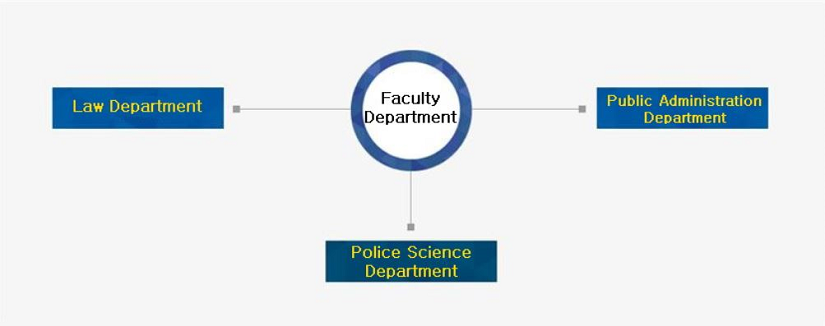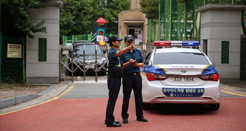
Curriculum
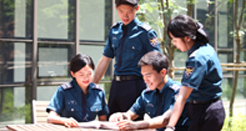
The course provides the basics for Law, Public Administration, and Police Science and students are required to take the course from their freshman year to the second semester of their junior year.The students are required to earn a total of 54 credits, and while students of the Law Department are required to earn 24 credits from Law courses and 10 credits from Public Administration courses, students of the Public Administration Department are required to earn 20 credits from Law courses and 14 credits from Public Administration courses, and students of the Police Science Department are required to earn 20 credits each from Law courses and Public Administration courses.
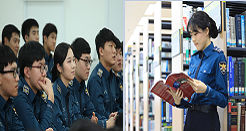
The Liberal Arts courses are composed of general liberal arts courses, which help students to cultivate leadership personality as university students, and foreign language courses, which would establish a foundation for students playing a leading role in the globalized modern society.
-
Mandatory Liberal Arts Courses
Mandatory Liberal Arts courses consist of Korean History, Public Ethics and Humanism, English and Culture, and Communication Skills.
-
Optional Liberal Arts Courses
Optional Liberal Arts courses consist of 21 lectures such as English Speech, Athletics, Second Foreign Language, and Cultural History, among which students would make choices.
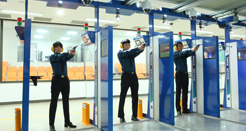
Consist of foreign language skills and IT skills, driving, shooting, and volunteering necessary for adapting to the globalized society.
-
Foreign Language
Freshmen are required to take the English and Culture courses, and those who have fulfilled the standards can choose to take the course as an optional Liberal Art course during one’s sophomore, junior, or senior year.
-
IT Skill
Students are intensively educated on IT skills during the seasonal sessions of their freshmen year, and should acquire at least one of the following certificates; Internet Information Administrator Level-2 or higher, Computer Specialist in Spreadsheet & Database Level-2 or higher, one or more Microsoft Office Specialist(MOS) Expert certification and MOS certification each.
-
Driving
Students would be educated on driving during the winter semester of their junior year and should acquire Driver’s License Level 1(Regular) after applying to the examination conducted at a Driver’s License Examination Office.
-
Volunteering Work
To practice the spirit of volunteer police and to cultivate diverse emotions through voluntary activities, students should complete volunteering work of 18 hours or more per semester, and a total of 144 hours or more within 4 years in various fields such as social welfare centers, farming and fishing areas, or on campus.
-
Assessment/Qualification of Designated Subjects that are Evaluated
Assessment/Qualification of Designated Subjects that are Evaluated Categories Assessment Qualification Deadline Evaluated Foreign Language Skill ※ Refer to the chart below ※ Refer to the chart below Before the Appointment List of Inspectors is completed IT Skill (Students are to choose 1.) Computer Specialist in Spreadsheet & Database Level-2 or higher Internet Information Administrator Level-2 or higher MOS
(Microsoft Office Specialist)One or more Expert certification and Core certification each Driving Application to Driver’s License Examination Level 1(Regular) Shooting 15yd slow-fire 10 rounds, rapid-fire 20 rounds shooting 70 points or above Unevaluated Volunteer Work Submission of volunteer work certificate 18 hours or more every semester Autonomous -
Assessment of Foreign Language Skills and Qualifications
Assessment of Foreign Language Skills and Qualifications Foreign Language Assessment Qualification English - TOEIC
- TEPS(Seoul National University)
- TOEFL(CBT)
- TOEFL(IBT)
- TOSEL(Advanced)
- FLEX(Hankuk University of Foreign Studies)
- SNULT(Seoul National University)
- G-TELP(LevelⅡ)
- 750 points or above
- 700 points or above
- 220 points or above
- 83 points or above
- 630 points or above
- 650 points or above
- 65 points or above
- 77 points or above
Japanese - JLPT
- JPT
- SNULT(Seoul National University)
- FLEX(Hankuk University of Foreign Studies)
- Level 2 or higher
- 630 points or above
- 60 points or above
- 600 points or above
German - ZMP(German Exam and Diploma)
- SNULT(Seoul National University)
- FLEX(Hankuk University of Foreign Studies)
- Level 4 or higher
- 60 points or above
- 600 points or above
French - DELF(French Exam and Diploma)
- SNULT(Seoul National University)
- FLEX(Hankuk University of Foreign Studies)
- B1 or Higher
- 60 points or above
- 600 points or above
Chinese - HSK
- SNULT(Seoul National University)
- FLEX(Hankuk University of Foreign Studies)
- Level 5 or higher
- 60 points or above
- 600 points or above
Spanish - DELE(Spanish Exam and Diploma)
- SNULT(Seoul National University)
- FLEX(Hankuk University of Foreign Studies)
- B2 Spanish Exam and Diploma
- 60 points or above
- 600 points or above
Spanish - SNULT(Seoul National University)
- FLEX(Hankuk University of Foreign Studies)
- 60 points or above
- 600 points or above
Arabic - FLEX(Hankuk University of Foreign Studies)
- 600 points or above




